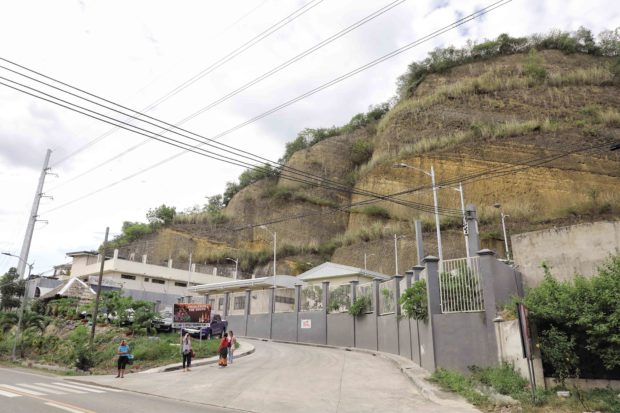Villar: DPWH learned painful lesson in Natonin landslide

HIGH RISK Another government building declared unsafe by the Department of Environment and Natural Resources is the Bureau of Jail Management and Penology office in Naga City, Cebu province. —TONEE DESPOJO/CEBU DAILY NEWS
BAGUIO CITY — Public Works Secretary Mark Villar on Friday urged government engineers to seek or develop engineering innovations for geologically-weak terrain, admitting that the Department of Public Works and Highways (DPWH) had built structures on hazard zones.
“We have to be aggressive in finding appropriate engineering solutions and new technologies for landslide-prone areas,” Villar said at the 14th national conference of district engineers held at Camp John Hay.
“The district office in Natonin was constructed in a hazard area, unfortunately, and we paid a heavy price for that mistake,” Villar said, referring to the Mountain Province town where a massive landslide dragged down the district engineer’s office when Typhoon “Rosita” (international name: Yutu) struck Luzon on Oct. 30.
Search and retrieval operations unearthed the bodies of 22 people who took shelter at the DPWH building at Barangay Banawel.
Painful lesson
Villar described the tragedy as a “hard and painful lesson everybody should take to heart.”
“Engineers must do everything within their power to prevent another Natonin-like tragedy from happening,” he added.
The secretary said he ordered the inspection of all DPWH buildings in the country and directed government engineers to relocate government facilities standing on geologically-hazardous areas.
The DPWH will be guided by hazard maps from the Mines and Geosciences Bureau and the Department of Science and Technology and would require soil testing before projects are started, Villar said.
In Benguet province, the Department of Education (DepEd) is heeding government geologists who suggested relocating two public schools perched on potential landslide areas in the mining town of Itogon.
No choice
The agency needed to find new areas for Ucab Elementary School and Goldfield Primary School, which were near the site of the Sept. 15 landslide in the mining town of Itogon that was triggered by Typhoon “Ompong” (international name: Mangkhut), according to Nerissa Barbosa, disaster risk reduction management office coordinator of the DepEd in Benguet.
But until DepEd finds safer locations, Itogon students would still be using the Ucab and Goldfield schools, said Rosita Dayag, Itogon schools district supervisor.
“With extra precaution and vigilance classes must resume and learning must continue. We are left with no choice,” she said.
In January, the students will also have to take Saturday classes to make up for lessons they missed in September and October due to Ompong and another storm, Rosita, Dayag said.
Barbosa said the DepEd evaluated 36 other schools damaged by storms in Itogon and have concluded that these buildings required rehabilitation, not relocation.
That task needed a P75-million budget, said Ferdinand Sangcaan, DepEd Benguet division engineer. —Kimberlie Quitasol














